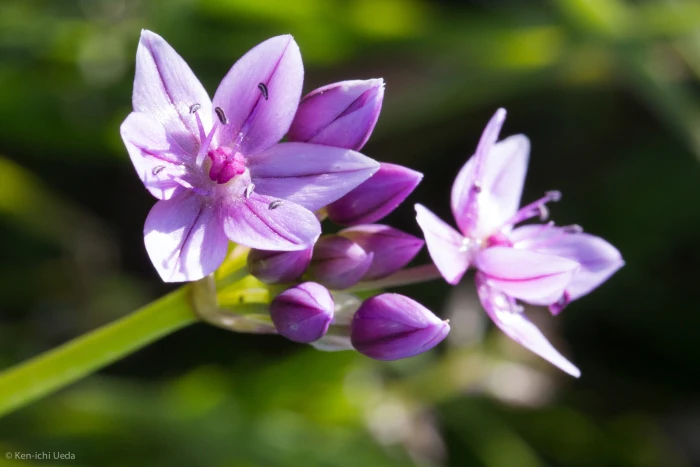Glassy Onion
/
(Allium hyalinum)
Glassy Onion (Allium hyalinum)
/

Ken-ichi Ueda
CC BY 4.0
Image By:
Ken-ichi Ueda
Recorded By:
Copyright:
CC BY 4.0
Copyright Notice:
Photo by: Ken-ichi Ueda | License Type: CC BY 4.0 | License URL: http://creativecommons.org/licenses/by/4.0/ | Rights Holder: Ken-ichi Ueda | Publisher: iNaturalist | Date Created: 2019-02-24T15:12:22-08:00 |

























Summary
Allium hyalinum, commonly known as Glassy Onion, is a perennial herb that is native to California, specifically thriving in the chaparral, foothill woodlands, and lower montane forests of the Sierra Nevada and Coast Ranges. It is typically found at elevations ranging from 160 to 4,920 feet. This species forms a cluster of bulbs and produces stems that can reach up to 12 inches in height, each topped with an umbel of up to 25 star-shaped flowers. The flowers are notable for their six shiny, translucent tepals that start white and may develop a pink tint as they mature, becoming almost glass-like with age. The blooming period is in the spring to early summer, and the flowers are moderately showy, attracting pollinators such as bees.
Glassy Onion is appreciated for its unique, delicate flowers and is used in rock gardens, native plant gardens, and as an ornamental in dry, sunny borders. It requires well-drained soil, preferably sandy or rocky, and is drought-tolerant once established, making it suitable for xeriscaping. It thrives in full sun to light shade. While generally low-maintenance, it can be susceptible to bulb rot if overwatered or planted in poorly drained soils. There are no significant disease issues, but gardeners should be cautious of overwatering.CC BY-SA 4.0
Glassy Onion is appreciated for its unique, delicate flowers and is used in rock gardens, native plant gardens, and as an ornamental in dry, sunny borders. It requires well-drained soil, preferably sandy or rocky, and is drought-tolerant once established, making it suitable for xeriscaping. It thrives in full sun to light shade. While generally low-maintenance, it can be susceptible to bulb rot if overwatered or planted in poorly drained soils. There are no significant disease issues, but gardeners should be cautious of overwatering.CC BY-SA 4.0
Plant Description
- Plant Type: Herb, Bulb
- Height: 0.5-1 feet
- Width: 0.5-1 feet
- Growth Rate: Moderate
- Flower Color: Pink, White
- Flowering Season: Spring, Winter
- Leaf Retention: Deciduous
Growth Requirements
- Sun: Full Sun, Part Shade
- Drainage: Medium, Fast
Common Uses
Bee Garden, Butterfly Garden, Low Maintenance, Rock Garden
Natural Habitat
Native to chaparral, foothill woodlands, and lower montane forests within the Sierra Nevada and Coast Ranges of California
Other Names
Common Names: Hyaline Onion
Scientific Names: Allium hyalinum, Allium hyalinum var. hickmanii
GBIF Accepted Name: Allium hyalinum
